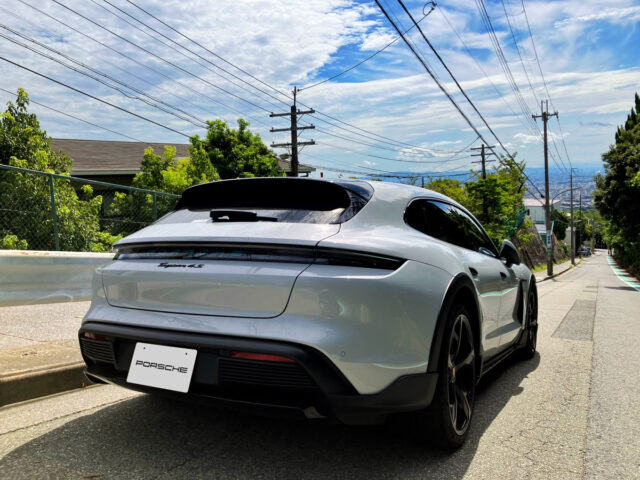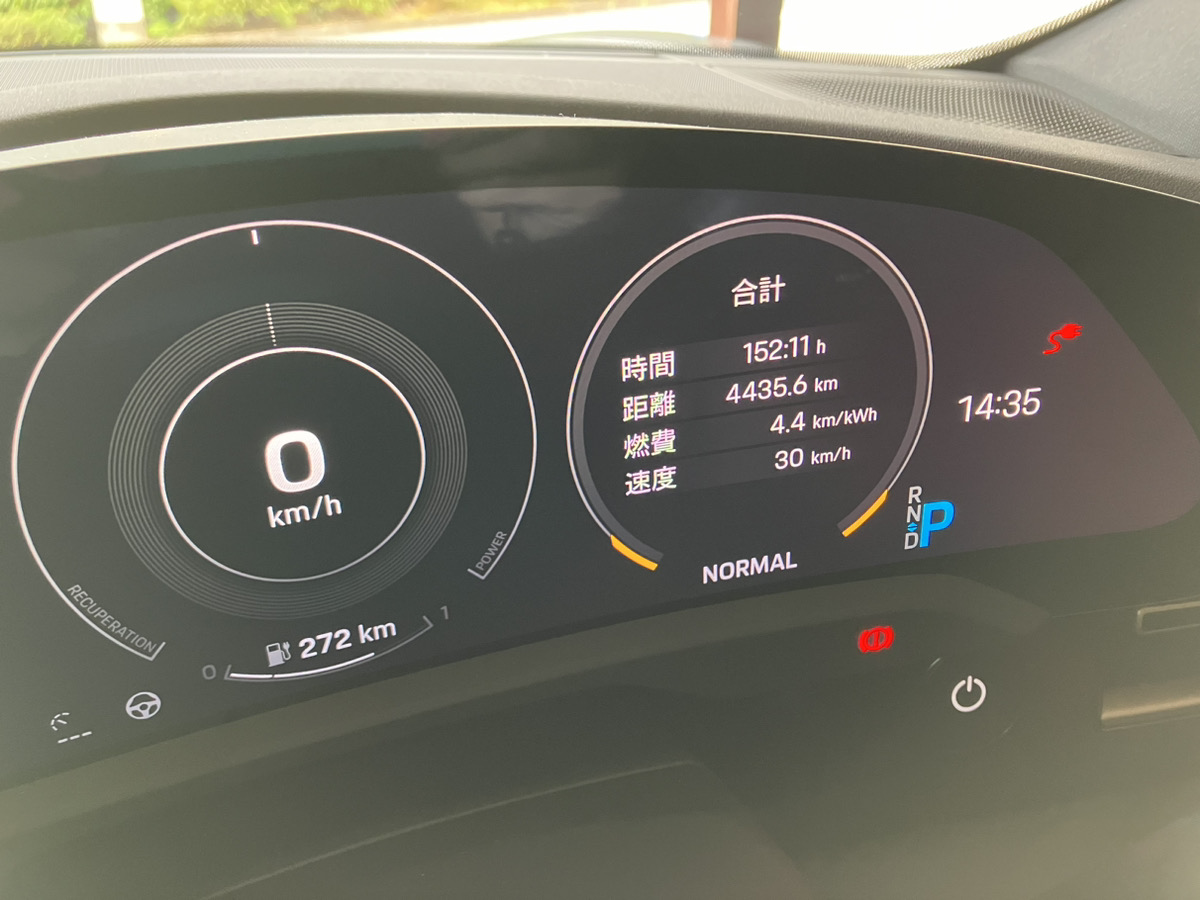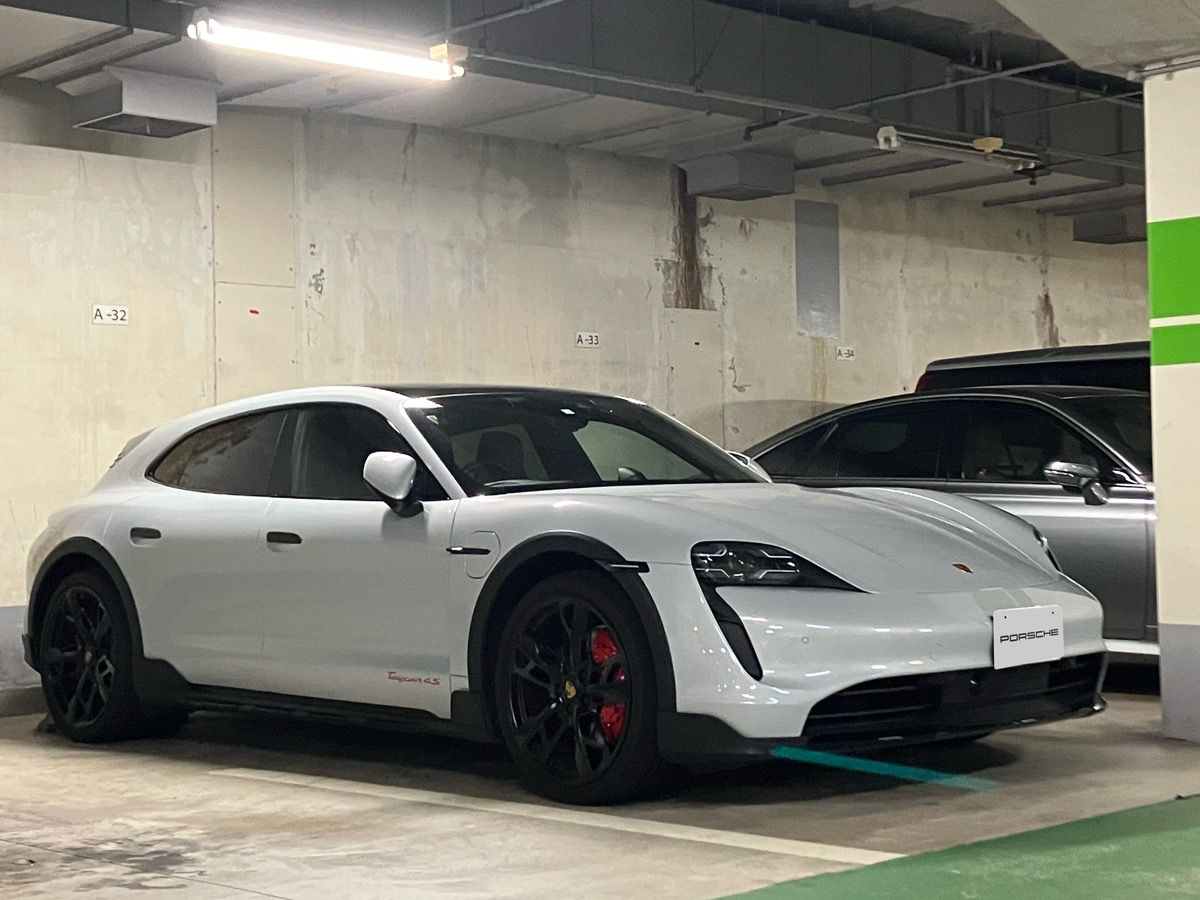It has been 7 months since I have owned Taikan. What are the actual electric costs? How many miles can I run on a full charge?
Published on: 2024.09.01

The Porsche Taikan 4S Cross Turismo arrived at our house at the end of January this year.
The Taikan has arrived at my home! The specifications and options of the delivered Taikan.
It was purchased used and the mileage at that time was about 8030 km, but now it is 14393 km.It ran about 6000 km in 7 months.(I ride every day, but I don't go far, so I haven't increased the distance.)
This time, after actually owning it.The cost of electricity in Taikan and how long a car can run on a full charge.I would like to introduce this based on actual data.
contents
Electricity costs in Taikan from February to August
Electricity cost (km/kWh) is an indicator of the distance an electric vehicle can travel with the consumption of one kilowatt-hour (kWh) of electricity. The higher the number, the longer the distance that can be traveled with less electricity.
So, below is the data on Taikan's runs from February to August, but first let me say no,The following figures will be data picked up from the Porsche application, but for some reason not all of the data is reflected.In March, I made a round trip from my home to Fuji Speedway and back, but that data is not included (the mileage for March is only 87 km), and the mileage data for the past 7 months is only 869 km.
I wonder if there is something wrong with the way I set it up....
Therefore, the following.
■February
Total running time: 223 minutes
Total distance traveled: 96 km
Average electricity cost: 3.0 km/kWh
■March
Total running time: 299 minutes (approx. 5 hours)
Total distance traveled: 87 km
Average electricity cost: 6.8 km/kWh
*Why was there a day when the electric cost was 33.3/kWh? Did it go all the way downhill?
■April
Total running time: 260 minutes (approx. 4.3 hours)
Total distance traveled: 74 km
Average electricity cost: 3.4 km/kWh
■May
Total running time: 591 minutes (approx. 9.9 hours)
Total distance traveled: 190 km
Average electricity cost: 3.8 km/kWh
■June
Total running time: 551 minutes (approx. 9.2 hours)
Total distance traveled: 151 km
Average electricity cost: 7.5 km/kWh
*Why was there a day when the electric cost was 111.1/kWh? Even though it was all downhill....
■July
Total running time: 346 minutes (approx. 5.8 hours)
Total distance traveled: 47 km
Average electricity cost: 4.2 km/kWh
■August
Total running time: 647 minutes (approx. 10.8 hours)
Total distance traveled: 224 km
Average electricity cost: 3.0 km/kWh
This was the content.
According to this, the average cost of electricity is about 3.39 km/kWh, with unusually high costs (33.3 km/kWh and 111.1 km/kWh) recorded in March and June, which could be due to measurement errors? These may be measurement errors?
However, this area is affected by factors such as driving distance, driving style, weather conditions, and road conditions, so it is actually hard to say.
Next, I got into the driver's seat of the Taikan and checked the trip data (although it seems to have been reset once, and not all the trip data since delivery).
Time: 152.11h
Distance: 4435.6 km
Electricity cost: 4.4 km/kWh
It had become a

The Taikan trip data seems more credible than the app, so then the electric cost would be 4.4 km/kWh.
The total charge capacity of the Taikan is approximately 90 kWh, which means that it can run approximately 400 km on a full charge.
Can run about 200 km daily.
."Can run 400 km on a full chargeWhether one considers this value to be high or low is up to the individual, but in reality, there are very few people in Japan who drive such a long distance every day. In fact, I think there are very few people in Japan who drive such a long distance every day. Therefore, if the car can run such a long distance on a full charge, there is no problem at all in daily life and even in occasional medium-distance driving (although it would be better to have a charging environment at home).
In my case, even if I travel far for work, it is only 150 km at most. Just the other day, I made a round trip to Kyoto and back, starting with the battery at 85% charge (I usually keep it at 85%, not 100%, considering battery life), drove about 150 km, and the charge was 451 TP3T when I got home.
Then, after that.Charged from 10:00 p.m. to 10:00 p.m., and by the time we rode at 8:00 a.m. the next morning, the charge had been restored to 72%.
If it recovers this much overnight, there is no problem. Even if you don't have fast charging at home, you can afford it if you have a 200 V regular charging system.

Before purchasing an electric vehicle, I had many concerns about the mileage and the lack of places to charge the battery, but now that I own one, I have no problems. In fact, it is very convenient because I no longer have to go to a gas station and can charge the battery at home just like I do with my iPhone.
If this is the case, I wish I had switched to electric cars earlier... (laughs)
I will also try to write more articles in the future on what I feel about actually owning a Taikan, in turn.
Follow me if you like this blog!


Comment ( 3 )
Trackbacks are closed.
I always enjoy looking at your site.
I am also the owner of a 991.1 and am considering converting my family car to a BEV for the weekly Saturday gigs.
At the moment, a used or new Tesla Model 3 is on the short list for the Taikan (or AUDI e Tron GT).
I have experience driving the Taikan as a loaner and the Tesla as a test drive, but they are very different cars, even though they are the same BEV.
The Tesla's interior and systems overturned the conventional concept of a car, and I felt that I needed to get used to the regenerative braking. On the other hand, the Taikan has the same controls and ride quality as the 911, which made me feel at ease. But I also thought that Tesla is also good for watching Youtube on the big screen.
So this question is: Is there any difference in charging environment between these two cars? As basic charging is done at home, and CHAdeMO is installed at SAs when we go away, and faster charging speeds are being developed than before, I feel that the advantage of the supercharger is decreasing than before.
I wish I could have two cars like you do, but if I had to choose one of them in terms of charging when I go away from home, what would it be?
snow samurai (Yusuke)
Thank you for everything!
>At the moment, a used or new Tesla Model 3 is on my list of candidates for the Taikan (or AUDI e Tron GT).
Oh that's great! That's right!
Sure, the Tesla is one pedal, and you have to get used to regenerative braking...
>Is there any difference in charging environment between these two cars?
In terms of recharging when we go away...this is just our feeling, but I have the impression that there is not much difference between the two.
I have never had a situation where I had to stop for a charge! I have never been in a situation where I had to go to a place where I could not charge the battery.
■ Teslas have good electric costs, so they can often get to their destination without recharging.
(I will check the location of the supercharger in advance, but often end up not having to use it. Also, I always have a special "Chademo-compatible charging adapter" in the car, so if there is charging at a hotel, etc., I used that.)
Although the electric cost of the Taikan is not as good as that of the Tesla, there are recently 90kw or more fast charging stations on highways at key locations, so charging there for about 30 minutes is completely safe.
(It is about 450 km from my house to Fuji Speedway, but I could afford to fast charge somewhere for 30 minutes once, 150kw at that time)
However, I have gotten into the habit of finding out in advance where fast charging and superchargers are available,
By making a prediction, such as, "Here is the battery, so even if the worst happens and the battery runs out of charge, I will be fine if I can get to this point," I feel that I can go on a long trip with peace of mind.
I've never had that feeling before with gasoline-powered cars (laughs).
I think that if you set off with such predictions in mind, you may be surprised to find that you don't have to worry about recharging your batteries.
Sorry, I may not have answered your question...!
Thank you. I see that it is important not only the battery dosage but also the electric cost of different car models.
The comfort of BEVs was taught to me on this blog and live. In Japan, BEV negative campaign is conspicuous, but I am planning to buy and enjoy it while it is unpopular and used cars are inexpensive!